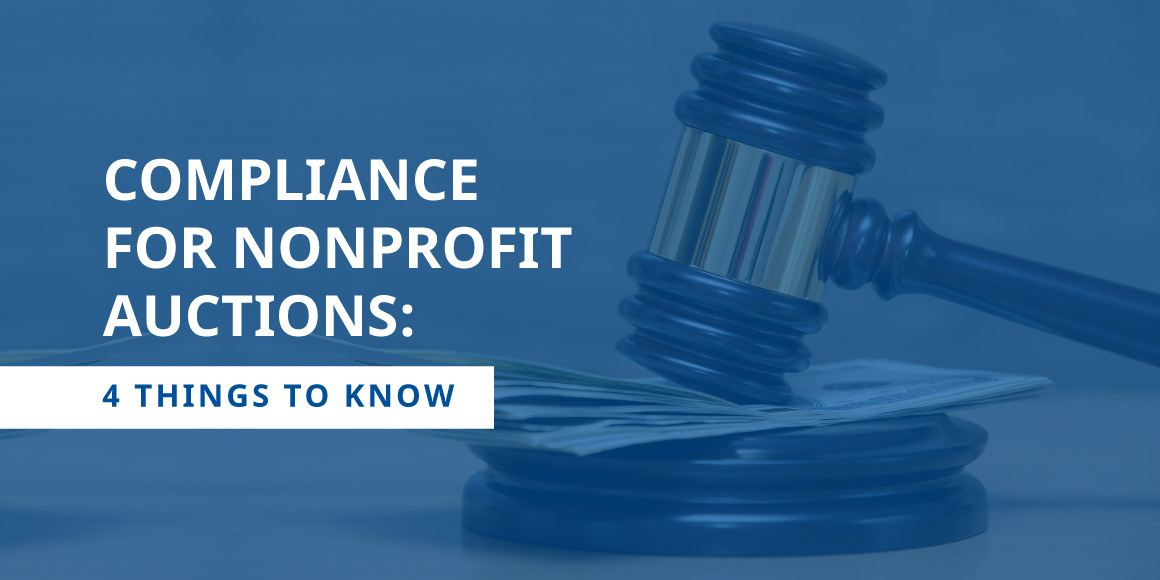Nonprofit auctions are popular fundraisers because they raise funds and build connections with local businesses at the same time. As such, a wide range of nonprofits from international enterprise-level organizations to local schools host auctions.
However, before planning an auction, all nonprofits will need to take necessary legal matters regarding auctions into consideration. While there are legal requirements for fundraising in general, auctions have specific rules and regulations that need to be followed depending on where the nonprofit is based.
Maintaining compliance with state and local fundraising laws is necessary for operating transparently and responsibility. Additionally, failing to comply can result in harsh penalties, including fines and even loss of your organization’s nonprofit status. Fortunately, there are nonprofit legal consulting firms available to help your team prevent these situations, as well as resources like this guide to help research nonprofit auction legal fundamentals, including:
- Games of Chance Licensing
- Charitable Solicitation Registration
- Tax Deductibility Information
- Auction Income Reporting
While nonprofit auctions may seem like they require a lot of legal expertise, they are still popular, widespread events for a reason. Plus, after following compliance measures for your first auctions, additional ones will only become easier after previously filing the necessary paperwork and becoming familiar with legal standards.
1. Games of Chance Licensing
In 41 states, organizations running an auction, no matter if it’s hosted in-person, online, or through hybrid means, must have the appropriate license. This also applies to other popular fundraising activities, such as raffles and bingo, that fall under the umbrella term “games of chance.”
Games of chance refer to activities where participants pay money for the opportunity to potentially win a prize, though compensation is not guaranteed. Whether or not a charity auction falls under this designation varies from state to state and municipality, so nonprofit event organizers should be sure to research their specific guidelines before planning an auction.
In addition to obtaining the proper licensing, auctions have a few other legal requirements related to their status as a game of chance. For instance, here are two major components of most games of chance licenses:
- Creating a special bank account for proceeds. Proceeds from your auction should be deposited into a separate bank account, created specifically for your event. Doing so will help you maintain accountability and compliance with gaming excise taxes, which may be due on your auction winnings.
- Informing guests about potential risks. You may not think of auctions as having risk in the traditional sense, such as warning guests of the potential for injury at a sporting event. However, as they are participants at your event, you should inform your guests about potential risks they may incur by attending your auction when they first sign up. Doing so helps create an agreement between you and your guests, ensuring that they will know what to expect from your event. Your auction software or platform should help you create these registration materials.
However, before registering for a license, carefully consult whether or not your state considers auctions to be games of chance. Some states will require games of chance licenses for certain fundraisers, such as raffles, but do not consider auctions, specifically, as games of chance due to winning bids always being exchanged for in-kind items or other forms of compensation. In these cases, it may still be worth it to gain a license in order to run other fundraising activities, but you won’t need it for the auction portion of your event.
2. Charitable Solicitation Registration
Before soliciting donations, nonprofits must complete their charitable solicitation registration, the process nonprofits must follow to gain the necessary licenses to solicit donations from a state’s residents. Attempting to fundraise before completing this process is technically illegal and can result in harsh penalties.
Labyrinth’s guide to charitable solicitation registration breaks down the steps for completing this process in depth. Here is a brief overview of the three main steps for registering to solicit donations:
- Research state-specific requirements. Charitable solicitation registration is required in over 40 states, and nearly every state has unique requirements. Take the time to research your state’s process, the office you’ll need to submit your application to, renewal deadlines, and any other details unique to your state’s process.
- Compile necessary forms. Your charitable solicitation application will require you to assemble several necessary documents and forms. Many states require the same forms, such as your Form 990, a copy of your nonprofit’s bylaws, and your articles of incorporation. This means nonprofits applying to solicit donations in multiple states will be able to do so faster if they keep these documents organized and on hand. However, many states also have state-specific forms that will need to be filled out for their unique application.
- Submit your application to the correct office. As mentioned, states even have different departments handle the charitable solicitation registration process. In most cases, your application will need to be submitted to the office of either your State Attorney General or your Secretary of State, depending on which manages your state charities bureau.
This process can be time consuming and also confusing as state requirements are liable to change at any time. If your nonprofit has questions or needs assistance during any step of the process, consider reaching out to a nonprofit legal consultant for assistance. Some nonprofits even partner with consulting firms who handle the submission process for them entirely, allowing their staff to focus on other activities, such as planning upcoming events.
3. Tax Deductibility Information
Large donations to charitable organizations are tax deductible, giving your donors a tax break at the end of the year. However, purchases at a charity auction are not always tax deductible. It is your nonprofit’s responsibility to inform guests about your state’s tax deductibility guidelines so they can file their taxes correctly.
What qualifies as tax deductible will vary by state and also the object purchased. Research your state’s laws ahead of time, and provide guests who win items and individuals who donated items to be auctioned at your event with receipts of purchase that includes the following information:
- Name of your nonprofit. Even though the item was donated by a third-party, your auction guests essentially purchased the item from your nonprofit, meaning your organization’s name will need to be connected to the sale of each item. For your donors, this acknowledges the exchange between your organizations.
- Description of the item. The item description does not need to be excessively detailed. Primarily, it needs to provide enough basic information that both you and your donors can identify the item from description and agree that it is the item purchased.
- A statement of what was provided in return for the item. For your auction winners, this will be a statement of how much they paid. However, for your item donors, this statement must specify that nothing was given in exchange for the item in order for it to be tax deductible. You will also not need to estimate the value of donated items, as that is the donor’s responsibility.
Additionally, auction income can fall under the category of unrelated business income, meaning it will not be exempt from income tax. Research your state guidelines to see if this applies to your region of operation.
Fortunately, you can still earn tax exempt income from your auctions through direct donations and volunteer grants. As Double the Donation’s guide to volunteer grants explains, volunteer grants are essentially free revenue your nonprofit can earn when volunteers who are employed by participating companies donate their time to your nonprofit. Get in touch with your volunteers to see if they qualify for a volunteer grant and help them fill out the necessary forms for their application.
4. Auction Income Reporting
As mentioned in the previous section, nonprofits will need to consider how to report their auction proceeds to the IRS carefully. While many of the previous licensing concerns revolved around state requirements, reporting auction revenue happens at the federal level, and thus all nonprofits operating in the United States will follow the same process.
When filing your tax returns, you’ll need to take a close look at the following reporting processes to ensure your auction is correctly accounted for:
- Form 990. For your Form 990, you will need to consider two different types of revenue: the income from selling items at your auction and the income of receiving items that will be auctioned. Most of your Form 990 will be able to be filled out by following the Generally Accepted Accounting Principles (GAAP), though there are some special considerations, such as property sales, though those will not apply to most charity auctions.
- Generally Accepted Accounting Principles (GAAP). GAAP is a set of standardized rules for financial reporting, and nonprofits can benefit from closely consulting these when documenting their auction’s revenue. For instance, GAAP states that a donated item should initially be recorded with its stated fair value. However, when the item is sold at auction, you’ll need to account for the difference in price between the initial value and what it sold for.
Keep in mind that this does not cover all reporting situations. For instance, GAAP is specifically for donated items, not services. This means that donated services are not recognized as income, and the proceeds for these types of items will be recognized as income from the event.
As this scenario demonstrates, there are many unique and complex situations that may arise during this process. Keep your budget and ledger in order and don’t hesitate to contact a nonprofit tax professional if you have questions or are unsure how to properly document a transaction.
Auctions are popular, reliable fundraisers for nonprofits for a reason. Your guests win tangible goods and services in exchange for helping a good cause, and your nonprofit can form lasting partnerships with local businesses.
Auctions just require a little more legal consideration than other events. Nonprofits hosting auctions will need to pay attention to both state licenses and federal reporting standards to ensure they and their guests maintain compliance. Take care to keep your key documents organized and consider reaching out to a nonprofit legal compliance consultant as needed.




